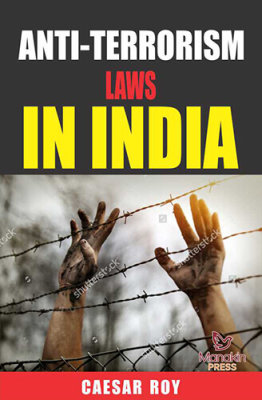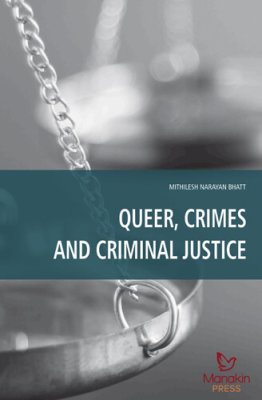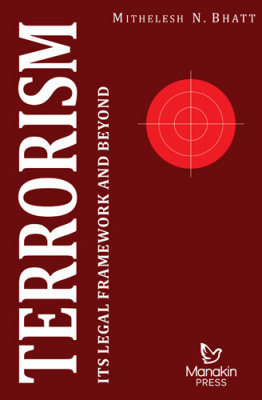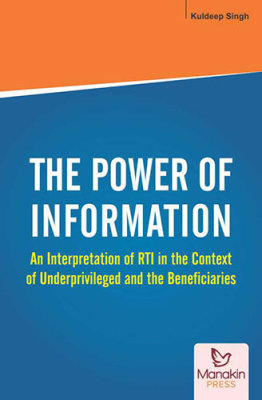
Anti Terrorism Laws In India
₹1,595.00
Caesar Roy | Category: LawBook Details
ISBN: 9789386677440
YOP: 2018
Pages: 372
Order also on
There is need for stringent provision for prevention of terrorism. In a country like India if a law regarding terrorism is enacted it should be made so stringent that the culprit is brought to book and does not go scot-free just because of loopholes or lacunas. The need for special laws to combat terrorism cannot be underestimated, actually, the problem lies with the implementation of laws and the abuse of powers conferred on the authorities under the special laws. This book has been divided into seven chapters. Chapter one introduces the subject. Chapter two highlights the antiterrorism legislations in India. Those Laws are discussed in Chapter three. These laws have been discussed in two heads – preventive laws and punitive laws. It includes the enactment and consequential repeal of various Antiterrorism legislation in India. A significant question that arises in this respect is; whether the terrorism can be prevented in the present shape and form altogether through law. The relevant issues have been discussed in this chapter. This chapter analytically explains anti-terrorism legislations in India. A study of such laws of those countries would be of great help in formulating a similar law for India. The need for extraordinary legislations on anti-terrorism in India and the constitutional validity of these laws are discussed in Chapter four. Some of the important features of the anti-terrorism laws of different countries are discussed in chapter five. In a democratic country like India, the role of the judiciary is significant. Judiciary is a faithful keeper of the constitutional assurances. Judicial approach on anti-terrorism legislation in India have been discussed in chapter six. It includes the trends of various High Courts and Supreme Court decisions on terrorism. In the last chapter, some suggestions have been given to make anti-terrorism laws more effective.
Key Features:
– In single copy, the knowledge about terrorism in India and abroad can be gathered.
– This book is a classic work on the subject that clarifies the anti-terrorism laws in a straight forward and easily comprehensive style.
– Covers all aspects and dimensions of anti-terrorism laws in India.
– Laws on terrorism of India and of different countries are elaborately discussed.
– Role of the judiciary on terrorist activities in India are mentioned and referred in numerous Supreme Court and High Court judgments.
– Some valuable suggestions are put forward to make the laws on terrorism more effective.
1. Introduction
2. Anti-Terrorism Legislations in India
3. Discussions on Anti-Terrorism Legislations in India
4. Need of Extra-Ordinary Laws and its Constitutional Validity
5. Anti-Terrorism Legislations of Some Countries
6. Indian Judiciary on Anti-Terrorism Legislations in India
7. Conclusion and Suggestions
Bibliography
There is need for stringent provision for prevention of terrorism. In a country like India if a law regarding terrorism is enacted it should be made so stringent that the culprit is brought to book and does not go scot-free just because of loopholes or lacunas. The need for special laws to combat terrorism cannot be underestimated, actually, the problem lies with the implementation of laws and the abuse of powers conferred on the authorities under the special laws. This book has been divided into seven chapters. Chapter one introduces the subject. Chapter two highlights the antiterrorism legislations in India. Those Laws are discussed in Chapter three. These laws have been discussed in two heads – preventive laws and punitive laws. It includes the enactment and consequential repeal of various Antiterrorism legislation in India. A significant question that arises in this respect is; whether the terrorism can be prevented in the present shape and form altogether through law. The relevant issues have been discussed in this chapter. This chapter analytically explains anti-terrorism legislations in India. A study of such laws of those countries would be of great help in formulating a similar law for India. The need for extraordinary legislations on anti-terrorism in India and the constitutional validity of these laws are discussed in Chapter four. Some of the important features of the anti-terrorism laws of different countries are discussed in chapter five. In a democratic country like India, the role of the judiciary is significant. Judiciary is a faithful keeper of the constitutional assurances. Judicial approach on anti-terrorism legislation in India have been discussed in chapter six. It includes the trends of various High Courts and Supreme Court decisions on terrorism. In the last chapter, some suggestions have been given to make anti-terrorism laws more effective.
Key Features:
– In single copy, the knowledge about terrorism in India and abroad can be gathered.
– This book is a classic work on the subject that clarifies the anti-terrorism laws in a straight forward and easily comprehensive style.
– Covers all aspects and dimensions of anti-terrorism laws in India.
– Laws on terrorism of India and of different countries are elaborately discussed.
– Role of the judiciary on terrorist activities in India are mentioned and referred in numerous Supreme Court and High Court judgments.
– Some valuable suggestions are put forward to make the laws on terrorism more effective.
1. Introduction
2. Anti-Terrorism Legislations in India
3. Discussions on Anti-Terrorism Legislations in India
4. Need of Extra-Ordinary Laws and its Constitutional Validity
5. Anti-Terrorism Legislations of Some Countries
6. Indian Judiciary on Anti-Terrorism Legislations in India
7. Conclusion and Suggestions
Bibliography
| Weight | 0.4 kg |
|---|---|
| Dimensions | 21.5 × 14 × 2.3 cm |
| yop |
2018 |
| subject-category |
Law |
| isbn |
9789386677440 |











Reviews
There are no reviews yet.